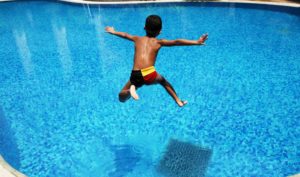IS YOUR POOL SAFE? 5 Tips for Homeowners

The month of May is both National Water Safety Month and the typical start of pool season. In 2020, installing a swimming pool was a popular home addition, as many families opted for “stay-cations” during these COVID quarantine times. Unfortunately, drowning remains the number one cause of accidental death for children ages 1 -4. Additionally, according to government statistics, there were on average an estimated 6,700 pool or spa-related ER visits for non-fatal injuries from 2015- 2017 for children younger than 15. Listed below are five tips to keep your pool safe.
1. Set Up Pool And Spa Barriers
For all pool installations requiring township approval, a fence around the pool is a requirement. But what about for pools that do not require a permit? Under Pennsylvania’s Uniform Construction Code, if a pool is more than 24 inches deep, it must be surrounded by a fence or an enclosure equipped with a gate that is self-latching. Above ground pools that are 48 inches high, can have the walls of the pool considered to be the “fence,” however, they must have a removable or locking ladder, which can be secured when the pool is not in use. It should be noted that four-sided isolation fences, which completely separate the pool from the house and rest of the yard, reduces a child’s risk of drowning by 83%. So, if your house serves as the fourth side of a fence around the pool, door alarms are to be used, in order to alert those in the house that someone is headed out to the pool.
2. Never Swim Alone
When you swim with a “buddy,” there is always someone else to watch the other for signs of trouble. Drowning is fast and silent. Drowning can happen quickly, within 20 – 60 seconds. With regard to children, always have adult supervision while children are inside the pool fence. Make sure children know that they cannot swim alone. Adults need to be reminded that alcohol consumption affects one’s balance and ability to get in and out of a pool. Among teenagers and adults, alcohol use was a factor in up to 70% of deaths that involved water recreation.
3. Learn to Swim and Learn CPR
Being able to swim is the best defense against drowning. Children who have formal swimming lessons can reduce the risk of drowning by as much as 88 %. Having children complete swimming lessons will not only help them feel more confident in the water, it will make you feel more comfortable too. Additionally, learning CPR will enable you to respond to any potential drowning emergency that could occur in your pool. The American Red Cross provides both swimming and CPR lessons and training at multiple convenient locations.
4. Make Sure Your Pool Drains Have Safety Covers
The extreme suction created by pool drains and skimmers can trap hair, jewelry, swimsuit strings and limbs under the surface of the water. Swimming pool entrapment is the term used when someone becomes trapped or stuck to the suction portion of pool equipment. In 2008 the Virginia Graeme Baker Pool and Spa Safety Act went into effect. The Act was named for Secretary of State James Baker’s granddaughter. Seven-year-old Virginia was a proficient swimmer, but the force of the suction of a hot tub was too strong for her and caused her to drown. Since that time, all public pools are required to have VGBA compliant covers. For the private homeowner, if you are installing a new pool, ask for an integrated Safety Vacuum Release Systems (SVRS), which automatically shuts the pool pump off in seconds, if a blockage is detected.
5. Know the Depth Before You Dive
Don’t just dive into a pool without knowing the depth of the pool. Diving is the 4th leading cause of paralyzing spinal cord injuries. A single dive can change your and your family’s life forever. Enter the pool feet first when you don’t know whether the pool is deep enough to dive into. A good rule of thumb is that the depth of the water should be at least twice your height in order to be safe to dive. Above-ground swimming pools are never deep enough for safe diving.
So, enjoy your pool this summer, but do it safely.
At Drake, Hileman & Davis, our personal injury attorneys have been concerned for the safety of those in our community for more than 35 years. We have been helping the injured find answers, whenever tragedy strikes. We have a proven track record of results and satisfied clients. We’re ready to answer your questions and provide you with the legal help you need. Contact us online or call us at 1-888-777-7098 to schedule your free consultation in the convenience of your home or at one of our five offices located throughout the region.

